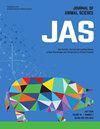单宁酸介导的肠道微生物增强大肠杆菌挑战断奶仔猪肠道免疫力。
IF 2.9
2区 农林科学
Q1 AGRICULTURE, DAIRY & ANIMAL SCIENCE
引用次数: 0
摘要
单宁酸(TA)具有收敛作用,可预防仔猪腹泻。本试验旨在研究低蛋白饲粮中不同水平TA(0、0.01%、0.05%、0.25%)通过调节肠道菌群对大肠杆菌攻毒断奶仔猪生长性能和肠道屏障功能的影响机制。本研究发现,低蛋白饲粮中添加不同水平的TA在一定程度上提高了断奶仔猪的生长性能(P < 0.10),显著降低了正常和大肠杆菌攻毒条件下仔猪的腹泻发生率(P < 0.05),但对仔猪营养物质消化率的影响不显著(P < 0.05)。0.05% TA能有效保持大肠杆菌k88攻毒仔猪肠道形态完整性,降低血清LPS、IL-1β和TNF-α水平,提高血清IgM和IgA浓度(P < 0.05)。此外,TA的添加增加了回肠或结肠紧密连接和水通道相关基因的表达,抑制了回肠TLR4/MyD88/NF-κB炎症通路(P < 0.05)。此外,饲粮中添加TA改变了大肠杆菌k88诱导仔猪结肠食糜微生物的多样性和结构组成。在属水平上,TA处理提高了Ruminococcaceae_UCG_005、Ruminococcaceae_UCG_002和Ruminococcaceae_NK4A214_group的丰度,而大肠杆菌攻击降低了Lachnospiraceae_XPB1014_group和Prevotellaceae_NK3B31_group的丰度,且这些差异微生物的丰度与免疫参数显著相关(P <0.05)。综上所述,在无抗生素低蛋白饲粮中添加0.05% TA可通过调节肠道菌群和TLR4/MyD88/NF-κB通路,减轻仔猪大肠杆菌感染,提高仔猪免疫力。本研究提供了一种新的营养策略,利用TA作为低蛋白日粮中有前途的抗生素替代品来对抗仔猪断奶后腹泻和促进肠道健康。本文章由计算机程序翻译,如有差异,请以英文原文为准。
Tannic acid-mediated gut microbes for enhanced intestinal immunity in Escherichia coli-challenged weaned piglets.
Tannic acid (TA) has astringent functions and prevents diarrhea in piglets. This study investigated the mechanism of different TA levels (0, 0.01%, 0.05%, 0.25%) in low-protein diets on growth performance and intestinal barrier function by regulating gut microbiota in weaned piglets challenged with Escherichia coli (E. coli). We found that low-protein dietary supplemented with different levels of TA enhanced the growth performance of weaned piglets to some degree (P < 0.10) and significantly reduced the incidence of diarrhea under both normal and E. coli-challenged conditions (P < 0.05), but its effects on nutrient digestibility in piglets were not significant (P > 0.05). The addition of 0.05% TA effectively preserved intestinal morphological integrity and decreased serum LPS, IL-1β, and TNF-α levels, as well as increasing serum IgM and IgA concentrations in E. coli K88-challenged piglets (P < 0.05). Moreover, TA supplementation increased gene expression related to tight junctions and water channels in the ileum or colon, as well as inhibiting the TLR4/MyD88/NF-κB inflammatory pathway in the ileum (P < 0.05). Additionally, dietary TA supplementation altered the diversity and structural composition of microbes in the colonic chyme of E. coli K88-induced piglets. At the genus level, TA treatment increased the abundance of Ruminococcaceae_UCG_005, Ruminococcaceae_UCG_002, and Ruminococcaceae_NK4A214_group, while E. coli challenge decreased Lachnospiraceae_XPB1014_group and Prevotellaceae_NK3B31_group abundance, and the abundance of these differentially microorganisms was significantly correlated with immune parameters (P <0.05). These results indicated that adding 0.05% TA to low-protein diets without antibiotics could alleviate E. coli infection and improve immunity in piglets by regulating gut microbiota and the TLR4/MyD88/NF-κB pathway. This study provides a novel nutritional strategy utilizing TA as a promising antibiotic alternative in low-protein diets to combat post-weaning diarrhea and promote intestinal health in piglets.
求助全文
通过发布文献求助,成功后即可免费获取论文全文。
去求助
来源期刊

Journal of animal science
农林科学-奶制品与动物科学
CiteScore
4.80
自引率
12.10%
发文量
1589
审稿时长
3 months
期刊介绍:
The Journal of Animal Science (JAS) is the premier journal for animal science and serves as the leading source of new knowledge and perspective in this area. JAS publishes more than 500 fully reviewed research articles, invited reviews, technical notes, and letters to the editor each year.
Articles published in JAS encompass a broad range of research topics in animal production and fundamental aspects of genetics, nutrition, physiology, and preparation and utilization of animal products. Articles typically report research with beef cattle, companion animals, goats, horses, pigs, and sheep; however, studies involving other farm animals, aquatic and wildlife species, and laboratory animal species that address fundamental questions related to livestock and companion animal biology will be considered for publication.
 求助内容:
求助内容: 应助结果提醒方式:
应助结果提醒方式:


